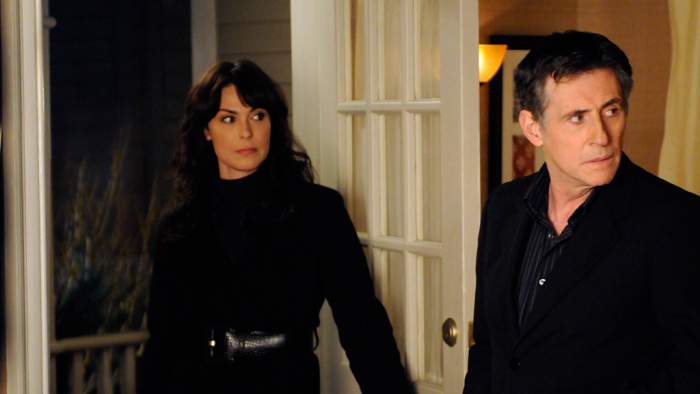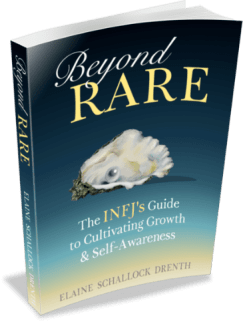I’ve lately been watching an acclaimed HBO series called “In Treatment.” Each episode offers an inside look at psychotherapy sessions with the show’s main character, Dr. Paul Westin (usually referred to as “Paul”), who I would type as an INFJ. The show cycles through sessions with several of Paul’s patients, detailing the unfolding of their lives across weeks of therapy. For personality and psychology enthusiasts the show does not disappoint, furnishing plenty of interesting material to digest and analyze.
One of my favorite elements of the show is when Paul himself undergoes therapy with his long-time mentor and colleague, Gina. In this post, we will explore a therapy session which is particularly interesting from a personality perspective. It comes from Season 1, Episode 25 (about 12 minutes in), in which Gina is counseling Paul and his wife, Kate, who is most likely an ESFP. Having gradually grown apart in their marriage, it highlights some salient INFJ-ESFP differences and compatibility issues that may have contributed to their relationship’s unraveling.

What follows is an excerpt of Paul and Kate’s therapy session with Gina, which we will then examine through the lens of personality type:
Kate: When Paul and I were first seeing each other, I couldn’t get over how seriously he took me. I’d never had that from anyone. Up until then I’d pretty much felt invisible. Also, there was the idea that under everything people say there is this hidden meaning which meant that everything had to be analyzed. So everything I said took on this importance because he was working so hard to figure me out. He was really the first person who tried to understand me and I just remember feeling very grateful to him for that. So it was quite a shock for me to realize that it wasn’t really about me…(Turns to speak directly to Paul) Understanding me is not about subtext, it’s not about the subconscious, it’s not about reading some kind of an x-ray. It’s just so clinical. Actually it’s worse because you use it against me. You think you know what I mean before I’ve decided what I mean. And how am I supposed to argue with that? I’ve got to go over everything ten different ways in my head; I can’t take anything at face value; nothing is ever simple. I hate it that that’s what I’ve become. I’m just a patient married to the doctor.
Kate (now talking about her affair): Initially, it was just excitement and adrenaline. The possibility that when I woke up in the morning I might do something that I hadn’t planned or that I didn’t even know I was capable of. And that’s who I was before I met Paul. And somewhere along the way that part of me died or was smothered. The point I’m trying to make is why can’t I just trust myself to be who I am.
Paul: Well, just because you don’t look doesn’t mean there is nothing underneath.
Kate (sarcastically): That’s very profound I’m sure.
Paul: But there’s a reason…
Kate: Just stop it. I do not want your intellectual interpretation of everything I say (long pause). I did it (i.e., had an affair) because I felt something…All I know is I have to feel it in my gut to believe it. Do you even remember what it feels like to be wanted? It’s not an argument you have to be convinced of. It’s a force that has to be reckoned with.
INFJ-ESFP Differences, Relationships, & Compatibility
I see two overarching points of salience in the above dialogue. The first involves the profound personality differences between Paul and Kate. The second, which is clearly inseparable from the first, pertains to the personality factors behind their initial attraction and later repulsion to one another.
In her characterization of Paul, Kate hits on a number of core features of the INFJ personality type. To start, she highlights Paul’s penchant for taking her seriously and attempting to understand her at a deeper level. As outlined in my book, The 16 Personality Types, INFJs see two people in everyone. On the one hand, they see how people appear, or the impression they attempt to make, on a surface level. More important to the INFJ, however, is who they are deep down at the level of the soul. For there INFJs glimpse what they consider most real and important—the authentic self.
INFJs are also concerned with what Kate describes as “hidden meanings” and “subtext.” The notion that “there is more than what meets the eye” is in many respects the INFJ’s motto, especially with respect to human beings. Since INFJs’ preferred function is intuition, they are constantly peering beneath or beyond appearances in search of deeper meanings and connections. Sensing types (especially ES types), by contrast, grant more credence to what meets the eye, that is, to how things appear or behave on the surface.
What makes personality studies so interesting, but also more complicated, is that these competing tendencies not only exist among the types, but within the individual. In the case of the INFJ and ESFP, this depth-surface dynamic takes place between their dominant and inferior functions. Namely, Introverted Intuition (Ni), which serves as INFJs’ dominant and ESFPs’ inferior function, is responsible for extracting deeper meanings / patterns from pools of sensory data (e.g., one’s overall impression of a person). By contrast, Extraverted Sensing, which operates as ESFPs’ dominant and INFJs’ inferior function, focuses mainly on the sensory details of an experience (e.g., a person’s lipstick color) or orchestrating the appropriate physical response to an external situation (e.g., ducking to avoid hitting one’s head). In focusing on different things, Ni and Se can furnish two markedly different versions or interpretations of reality.
Despite the radical differences between Ni and Se, the INFJ and ESFP may experience great passion and intrigue when they first encounter each other. Because INFJs are relatively rare, ESFPs may find themselves smitten with the sheer novelty of this type. But as discussed in my post, INTJ, INFP, INTP, INFJ Relationships & the Inferior Function, the passion derived from “opposites attracting” may eventually give way to deep misunderstandings and resentments after the initial novelty has worn off.
This is clearly the case in Paul and Kate’s marriage. What Kate first loved and admired about Paul—his seriousness, his depth, his intuitive interpretations, etc.—have gradually become objects of her disdain. Her affair reminded her of who she was before she became enamored with Paul’s Ni, of who she was when her dominant function (Se) was at the helms. This should in no way surprise us. After all, Kate’s natural propensity as an ESFP is not to subject everything to abstract analysis (e.g., “going over everything ten different ways in my head”), but to act spontaneously and instinctively (e.g., “feel it in my gut”). Tired of over-thinking things, we see Kate expressing her desire to return to her natural Se mode of operating, one that is more straightforward and takes things at “face value.”
While not included in the above excerpt, Paul at one point claims that he values Kate because she “keeps him grounded.” One often hears this from N types, who feel their S partners help them more effectively navigate or stay connected to the concrete aspects of life. Typologically speaking, their S mate serves as an embodiment and a sort of guarantor of the N’s inferior S function; there is a certain safety that comes from knowing one’s partner has an ample supply of whatever one lacks in one’s own personality.
But much like Kate, Paul had come to feel that what originally attracted him to Kate may no longer be enough. For at the same time Kate was having an affair, Paul had become intellectually and emotionally captivated by one of his long-time patients, Laura, who is most likely an ENFJ.

When engaging with Laura, Paul experiences a deep sense of connection and compatibility. In contrast to the doctor-patient structure that has long characterized his marriage, Paul feels, somewhat ironically, that Laura, despite technically being his patient, is actually more of his psychological equal. This nicely illustrates my earlier point about surface versus depth-orientations. On the surface, Paul’s relationship with Laura is one of doctor and therapist, while his marriage, conventionally speaking, might be viewed as an equal partnership. On a deeper level, however, the situation is actually reversed, with Paul and Laura functioning more like equal partners. It is this sense of equality and mutual respect that both Paul and Kate seem to be seeking but are struggling to find with each other.
Learn more about INFJs & ESFPs in our books:
The 16 Personality Types: Profiles, Theory & Type Development
Beyond Rare: The INFJ’s Guide to Cultivating Growth & Self-Awareness
Learn More…
Our New INFJ Book!

Learn More…
Our New INFJ Book!
Related Posts:
Extraverted Sensing (Se) & Introverted Intuition (Ni) in INJs vs. ESPs
Michale Lee says
Nicely-analyzed and written. Nevertheless, I wonder that in reality and your experience, N types would never work well with S types (particularly IS types) in long-term marriage?
If so, Could you be compassionate to convey another article for us about relationship & compatibility between S types?
Thanks and Best wishes Dr.
A.J. Drenth says
Hi Michale,
Thanks so much for your comment. I do believe that N-S pairings can be successful, but they may require more growth and work to optimally navigate N-S differences. Paul and Kate, for instance, could have chosen to really work on their relationship, but their long history of dysfunction and accumulated resentment made the prospect of doing so seem overwhelming, especially since both had enticing and arguably easier alternatives waiting in the wings.
Kay R says
Very good article as always.
My interest in this article is this time is also a bit of a personal nature. I am dating an ESFP (female) and am personally an INFJ (male). And I think we are in the faze when thous two types get misunderstandings about each other. Right now I am a bit off an am thinking about breaking things off, between us.
Mark E says
I’ve never seen this TV show, but I can relate to Kate’s frustration about being analysed or having someone apparently seeing deeper meanings in everything you say. I find that kind of thing puts me off balance: someone telling you things about yourself that you can’t see; how do you know if it’s true? You end up trying to analyse yourself and it gets very tiresome. For me it goes back to feeling it in mygut, as Kate says, and trusting in that, which gets me back to my centre.
What you have to realise, I think, is that intuitive types aren’t right all the time, even those with intuition as a dominant function. What they seem to have can seem magical and therefore attractive, but actually they aren’t superhuman after all.
JRW says
My husband and I have been together for 5 years now and friends for 11 years. He is an ESFP and I am an INFJ (female). While all relationships require give and take, I have found ours to be rewarding. As an INFJ I know that I need some Intuitive understanding in my relationships to make it feel fulfilling, but I also know that I can have meaning in a variety of relationships. My husband and I have very clear communication about holding space for each other: he listens and helps me talk out intuitive ramblings, and I join him in exploring whatever sensory experiences he enjoys. Truly any relationship can be rewarding if you can communicate clearly with empathy, hold space for and value differences, and not hold so tightly to your own reality that you are unable to appreciate the gems of people around you.
SP says
Yes this is accurate. Relationships between INFJ and ESF type variety WON’T work. It’s like trying to fit the square in the round hole. Relationships might need work either way but that’s not it. You have to know when to try. INFJ relationships are extremely difficult to establish and maintain starting with the type that you choose. If you go the usual ”infatuation” way excuse my French but you are being an idiot and are in for heartache for both sides. Just…don’t. Use Ni please for your sake.
JRW says
I am so sorry that you have had such bad experiences. I hope that at some point your Fe heals enough to help you enjoy all types of relationships. ????
Sam says
When this article was brought to my attention via email, I was immediately intrigued. Coincidentally enough, I am an INFJ male who recently married an ESFP female. We are not having any marriage problems – I’d say I am confident that our relationship is very healthy and balanced. However, I do relate to the points raised here with regards to our differences and challenges we face when we handle conflict and complications.
Thanks for sharing this article!